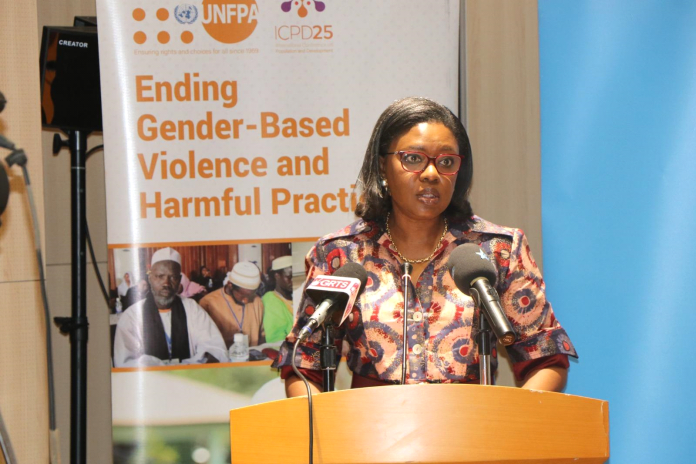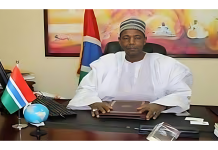By Ndey Sowe
The UNFPA-Gambia representative, Ndéye Rose Sarr, has urged the government of The Gambia to immediately act by showing a strong political commitment, mobilise resources to fund anti-FGM programmes and increase collaborations, as sustainable development requires strengthened collaboration among key stakeholders to leverage resources, enhance programme impact, and expand global and national advocacy campaigns on female genital mutilation.
“Despite all the work the Joint programme and partners are doing to end this practice in The Gambia, girls are still not safe; girls are still undergoing FGM, and girls still do not have equal rights. We all have a role to play in the fight against Female genital mutilation,” she reflected.
She made these remarks on the commemoration of the International Day of Zero Tolerance against FGM under the theme: “Partnership with Men and Boys to Transform Social and Gender Norms to End FGM”.
6 February 2023 marks the 12th anniversary of the ‘International Day of Zero Tolerance for Female Genital Mutilation’, established by the United Nations General Assembly in line with the 2030 Agenda for Sustainable Development.
The day provides the opportunity for Governments, Member States, civil society organizations, development partners, activists, and other relevant stakeholders to raise awareness, renew commitments and intensify efforts in the fight against female genital mutilation, which is an unacceptable harmful practice and a violation of women and girls’ basic human rights.
“We are here today in partnership with the Government and Civil Society organizations, to commemorate the Zero Tolerance and to demonstrate our solidarity with the rest of the world in our collective stand against and efforts to end all forms of harmful practices that affect women and girls globally, The Gambia in particular. The protection of the rights and wellbeing of women and girls is a collective responsibility for all, and our coming together to commemorate this day is testimony to our resolve to ensure that no girl or woman goes through any form of violence”, she added.
While saying the theme this year is very timely, she said for far too long, men and boys have been passive actors in our response to FGM, even when they are at the centre of most decision-making. It is about time to engage them to take active roles in ending this harmful practice.
She emphasised that working with men and boys to promote positive masculinity with the aim of securing gender equality and ending all forms of harmful practices is very critical in ensuring just and fair societies for all.
FGM, which comprises procedures that involve, altering or injuring the female genitalia, is a violation of the fundamental rights and freedoms of women and girls. In The Gambia, the prevalence of FGM in women aged 15–49 stands at 74.9%, an extremely high rate for an estimated population of 2.6 million people.
FGM is a hindrance to the empowerment of girls and women, causes serious long-term psychological and health complications. Some of such include: increased risks of HIV infection, sexual and reproductive health complications, including Obstetric Fistula.
“Young girls and boys from an early age must learn that violent behaviour towards girls is unacceptable and that parents should be supported in gender-responsive parenting, including positive gender socialization that supports the elimination of FGM and GBV”, she stressed.
She therefore called for the empowering communities to lead shifts in social and gender norms that sustain FGM as a harmful practice is central to the Joint Programme’s approach. Men are never “just” men. Their gender is shaped by, and impacts their position as fathers, husbands, community and religious leaders.
For the purpose of readership, The UNFPA and UNICEF Joint Programme engages men and boys in interrogating and challenging power dynamics in their own lives, as well as in their communities, while also seeking to empower them as partners in the elimination of FGM rather than simply as perpetrators of violence. In societies, women take the decision to have their daughters undergo FGM while men and boys may oppose the continuation of FGM, they may also have misperceptions about other men’s acceptance of FGM or view FGM as a ‘women’s issue’. For this reason, advocacy by men and boys continues to be a priority intervention and a key approach towards the elimination of FGM.
“Today, we stand with communities here and around the globe working to prevent FGM/C. We therefore call on men and boys, fathers and husbands, girls and their families, teachers, health workers, community and religious leaders, and government officials to act together to make a difference. As it’s time to put an end to this harmful practice, and to allow women and girls to reach and maximize their full potential in a conducive environment free from discrimination and abuse”, she reiterated.
In addition to this, she urged that girls must be educated on their right to decide what happens to their bodies, we need to break the silence and unite to eliminate FGM today and always.
Female genital mutilation (FGM) comprises all procedures that involve altering or injuring the female genitalia for non-medical reasons and is recognized internationally as a violation of the human rights of girls and women.
It reflects deep-rooted inequality between the sexes, and constitutes an extreme form of discrimination against women and girls. The practice also violates their rights to health, security and physical integrity, their right to be free from torture and cruel, inhuman or degrading treatment, and their right to life when the procedure results in death.
To promote the abandonment of FGM, coordinated and systematic efforts are needed, and they must engage whole communities and focus on human rights and gender equality. These efforts should emphasize societal dialogue and the empowerment of communities to act collectively to end the practice. They must also address the sexual and reproductive health needs of women and girls who suffer from its consequences.
UNFPA, jointly with UNICEF, leads the largest global programme to accelerate the abandonment of FGM. The programme currently focuses on 17 African countries and also supports regional and global initiatives, themed “Achieving the new Global Goals through the elimination of Female Genital Mutilation by 2030.”
The 17 goals – known as the Sustainable Development Goals, or simply the Global Goals – aim to transform the world over the next 15 years. They build on the success of the Millennium Development Goals, global objectives adopted in 2000 that have helped to improve the lives of millions of people around the world.
UNFPA is working with governments, partners and other UN agencies to directly tackle many of these goals – in particular Goal 3 on health, Goal 4 on education and Goal 5 on gender equality – and contributes in a variety of ways to achieving many of the rest.






















